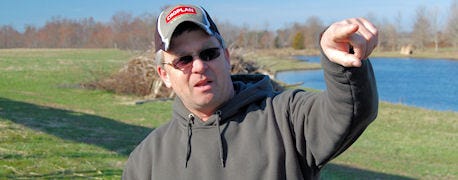
Hans Schmidt on Eastern Shore Maryland is a state-certified ag conservation steward – one of soon-to-be 100 farmers across the state recognized for exemplary conservation and environmental advocacy.
Schmidt's Sudlersville farm sits across the Chesapeake Bay from Baltimore. That puts his farm operation almost in the center of the Chesapeake Bay water quality controversy. But he's not concerned.

CERTIFIED AND VERIFIED WATER STEWARD: Maryland soybean producer Han Schmidt is a certified outstanding water steward, verifies the United Soybean Board.
As president of Maryland's Association of Soil Conservation Districts and Maryland Soybean Board chairman, he's already meeting EPA's Chesapeake Bay model requirement for his farm. And he's pleased to show what farmers are doing on behalf of the Bay clean-up. That's why Schmidt was one of four U.S. farmers recently honored for outstanding water stewardship by the United Soybean Board.
Stewardship certification and regulatory certainty
On May 6, Maryland's Farm Stewardship Certification and Assessment Program will honor its 100th certified farm, reports Gerald Talbert, who coordinates the FSCAP program administered by Maryland Association of Soil Conservation Districts. The 100th steward is Bill Gardenhour of Gardenhour Orchards at Smithsburg, Md.
FSCAP requires fully compliant nutrient management plans and that all soil conservation and water quality concerns have been addressed with best management practices. The assessment aspect covers all owned and leased land. Certification gives stewards first opportunity in MASCD projects, such as the Pollinator Habitat Project, says Talbert.
~~~PAGE_BREAK_HERE~~~
To date, 147 assessments have been done on 126 farms involving 29,630 acres in 16 counties. "We feel that FSCAP recognition can inspire some farmers to do a little more, although most have met or exceed the standard for years," adds Talbert.
"We've installed 30X24 two-sided signs. Many of our stewards believe the recognition of doing a great job in conservation is also good for business."
Maryland's new Agricultural Certainty Program will soon be rolling out next-level regulatory protection. Administered by Maryland Department of Agriculture, it, too, requires a fully compliant nutrient management plan, but covers owned land only. A farmer can sign up parcel by parcel.
Certainty requires a baseline assessment with MDA's Nutrient Tracking Tool software to confirm that each farm parcel is in compliance with the Total Maximum Daily Load plan in effect. While FSCAP doesn't require that, 22 stewards already have the baseline assessment performed, notes Talbert. Certainty requires inspections every three years by an assessor.
MDA-certified verifiers determine compliance with local, state and federal environmental requirements. Once a farm is approved, the operation is excused for a 10-year period from meeting new regulatory programs or standards that put further restrictions or performance standards in place to address nitrogen, phosphorus or sediment runoff. Participating farms also must undergo inspections by a certainty verifier at least once every three years with oversight provided by Maryland Department of Environment.
The Certainty program is scheduled to open soon. For more details, see the above noted website, visit a Maryland soil conservation district office or contact Colin Jones, MDA's Agricultural Certainty Program Coordinator at 410-841-5868 or email [email protected].
About the Author(s)
You May Also Like




